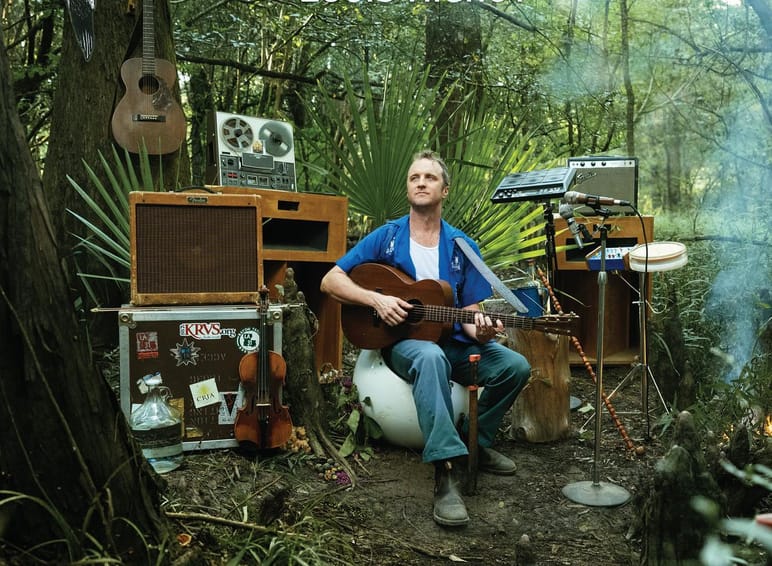My Page: Lost Bayou Ramblers’ Louis Michot “The Troubadour’s Dream”

Lost Bayou Ramblers took home a Regional Roots Music Album Grammy yesterday for their collaboration with the Louisiana Philharmonic Orchestra, Made In New Orleans. In this essay, the group’s singer/fiddler describes stepping out of his comfort zone while still staying in the magic on his new solo effort, which he released in September.
***
Cultural sustainability in South Louisiana is rooted in both our land and language—and both have been at risk for many decades. Over the past few years, I’ve been fortunate to have had the time to take further steps toward cultural sustenance by bringing solar power to native communities who live in the most fragile extremities of the coast, and by bringing my musical and linguistic dreams to life on my first solo record. Both of these processes were happening at the same time—in part from the necessity brought on by Hurricane Ida and in part by the idle time brought on by the pandemic.
It was never my dream to make a solo record, but this album did come from my dreams. Though the first few years of the pandemic were certainly rough on musicians, the one thing I gained from the forced break from touring was the time to record my musical thoughts. This often came from my dreams. I would wake up before dawn—with melodies and rhythms rolling through my head—then quietly make myself a coffee and head to my studio, which, at the time, was a dry[1]docked houseboat named Sister Ray located only a few steps from my house in Prairie Des Femmes, La.
Rêve du Troubadour was born from early mornings like these, slowly recording the songs from my dreams and staying up late at night to finalize the process until I was happy with the results. I never meant to make a solo record, but once enough of these songs came to life, it was apparent that I was building a new repertoire that was not meant for Lost Bayou Ramblers or any of my other bands.
The common thread throughout all of my music over the last 25 years has been the Louisiana French language. Cajun and Creole French have been carried forward over the last hundred years primarily through music, but as our culture is tied to the Louisiana coast, the fastest disappearing landmass in the world, cultural sustainability has been a struggle. When Hurricane Ida hit the Terrebonne and Lafourche parishes, two hours south of here, I was in the middle of recording the songs that would become Rêve du Troubadour. In the late-night hours of Aug. 29, 2021, after seeing calls for help on Twitter, I decided to make a crowdfunding post on the Nouveau Electric Records and Lost Bayou Ramblers social media pages. The next morning, with thousands of dollars of funds raised overnight, we caravanned down to Houma, La., and set up at our friend A.J. Rodrigue’s house to repair his roof. Our buddy B-Boy Brown joined in with his BBQ trailer and started passing out free BBQ, water and gas while some of us set to work patching the roof. A line quickly formed around the block and many of the first people to come to us had tears in their eyes, thanking us for providing food and filling up their gas tanks so that they could drive to their elderly parents’ houses to check on them without worrying about running out of fuel. The entire parish was full of downed power lines, and it was apparent that the residents would be without electricity and water for weeks.
That afternoon, I checked in with a friend, Monique Verdin, who was doing similar disaster response work in neighboring towns, helping her family members in the Native American communities of Pointe-Au-Chien, Bayou Dularge and Grand Bois. She was also trying to get gas for generators so that they could charge their phones and maybe power a window unit for the elderly, as the post hurricane heat was setting in. We both agreed that, for future responses, solar power with battery backup would be the way to go, and we quickly shifted our fundraising efforts toward procuring solar generators through the Footprint Project and New Use Energy—both of which were already on site with emergency power banks in these same communities. Over the next year, we were able to deliver these compact but powerful solar generators to elder culture-bearers in each community. We also organized the Louisiana Sunshine Festival with the help of Feed the Second Line, an organization that focuses on providing solar power to local restaurants in the face of grid failures due to natural disasters. Together, we raised funds to procure as many solar generators as we could purchase and sent them out to communities along the coast. The process is ongoing, and the hope is that—next time a hurricane hits the Louisiana coast—these communities will be a step ahead of the situation they experienced after Hurricane Ida and will be able to provide the basic needs for themselves until power is restored.
After months of focusing on sustainable disaster recovery, I was able to get back into my studio, and the beginning of 2022 proved to be one of the most fertile songwriting streaks in all my years as a musician, including “Rêve du Troubadour,” the title track of what would become my debut solo album.
“The Troubadour’s Dream” represents the world I walk through as an artist, both inside my head and while navigating the real world— taking risks to leave my comfort zone and sustaining myself in the world while still staying in my magic.



















